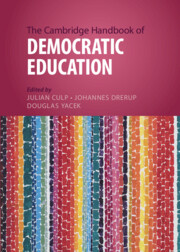Book contents
- The Cambridge Handbook of Democratic Education
- Cambridge Handbooks in Education
- The Cambridge Handbook of Democratic Education
- Copyright page
- Contents
- Contributors
- Acknowledgments
- Introduction
- Part One Historical Perspectives
- Part Two Philosophical and Normative Foundations
- Part Three Key Topics and Concepts
- 16 Educational Justice and Democratic Education
- 17 Global Justice and Democratic Education
- 18 Debate and Deliberation in Democratic Education
- 19 Agonistic Democracy and the Question of Education
- 20 Punishment and Democratic Education
- 21 Children’s Rights and Democratic Education
- 22 Education, Trust, and the Conversation of Democracy
- 23 Patriotism and Democratic Education
- 24 The Voice of Poetry in Cultivating Cosmopolitan and Democratic Imagination
- 25 Disability and Democratic Education
- Part Four Challenges
- Index
- References
20 - Punishment and Democratic Education
from Part Three - Key Topics and Concepts
Published online by Cambridge University Press: 20 April 2023
- The Cambridge Handbook of Democratic Education
- Cambridge Handbooks in Education
- The Cambridge Handbook of Democratic Education
- Copyright page
- Contents
- Contributors
- Acknowledgments
- Introduction
- Part One Historical Perspectives
- Part Two Philosophical and Normative Foundations
- Part Three Key Topics and Concepts
- 16 Educational Justice and Democratic Education
- 17 Global Justice and Democratic Education
- 18 Debate and Deliberation in Democratic Education
- 19 Agonistic Democracy and the Question of Education
- 20 Punishment and Democratic Education
- 21 Children’s Rights and Democratic Education
- 22 Education, Trust, and the Conversation of Democracy
- 23 Patriotism and Democratic Education
- 24 The Voice of Poetry in Cultivating Cosmopolitan and Democratic Imagination
- 25 Disability and Democratic Education
- Part Four Challenges
- Index
- References
Summary
The current retributive system of school punishment conflicts with the aims of democratic education because it impedes the cultivation of essential democratic values and capabilities. To be legitimate, however, school punishment in democratic societies ought to align with, or at least not impede, the aims of democratic education. This suggests that punishment should be consistent with the communicative and inclusive nature of democracy and support the cultivation of essential democratic capabilities. Restorative justice provides such a model of school punishment by prioritizing communication and inclusion, facilitating the cultivation of democratic capabilities, and legitimizing punishment as a means of communicating remorse instead of inflicting retribution to wrongdoers. The authors argue that for school punishment to align with and support the aims of democratic education, it must shift from the retributive justice model currently employed in most schools to a restorative justice model.
Keywords
- Type
- Chapter
- Information
- The Cambridge Handbook of Democratic Education , pp. 328 - 345Publisher: Cambridge University PressPrint publication year: 2023

